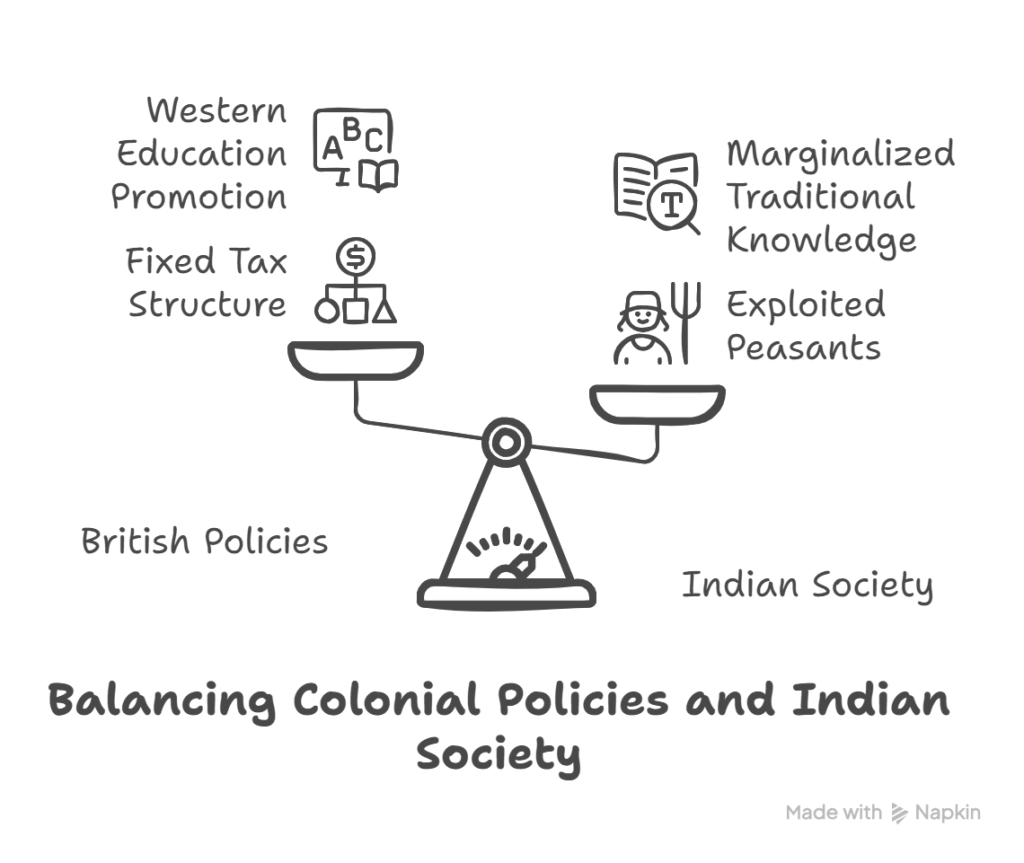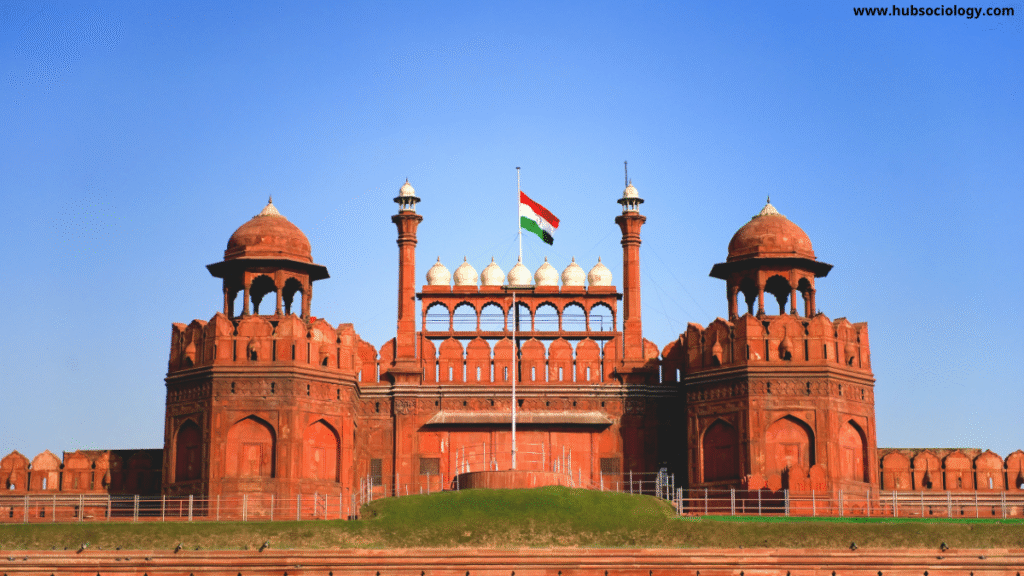Introduction on Colonial Understanding of Indian Society
Bernard S. Cohn (1928–2003) was a prominent anthropologist and historian whose work significantly contributed to the understanding of colonial India from a sociological perspective. His research focused on how British colonial rule shaped Indian society, culture, and administrative structures. Cohn’s works are essential in postcolonial studies, as they reveal how colonial knowledge systems were constructed and how they influenced Indian social hierarchies, identities, and governance.

This article explores Cohn’s contributions to the Colonial Understanding of Indian Society in sociological way, focusing on his key arguments about the colonial construction of knowledge, the reinterpretation of Indian traditions, and the institutionalization of caste and religion.
Table of Contents
Colonialism as a Knowledge System
One of Cohn’s most significant contributions was his argument that colonialism was not just a political and economic enterprise but also a system of knowledge production. In his seminal essay “The Command of Language and the Language of Command” (1985), Cohn examined how the British colonial administration in India sought to understand and categorize Indian society to govern it effectively.
1. Orientalist Knowledge and Colonial Control
Cohn built upon Edward Said’s Orientalism (1978) but focused more specifically on how colonial administrators, linguists, and ethnographers produced knowledge about India. The British, through institutions like the Asiatic Society of Bengal (founded by William Jones in 1784), studied Indian languages, texts, and customs. However, this knowledge was not neutral; it was shaped by colonial interests.
For example, the British relied heavily on Brahmanical texts (like the Manusmriti) to interpret Hindu law, ignoring the diversity of local customs. This selective reading reinforced caste hierarchies and solidified Brahmanical dominance, as colonial courts often upheld Brahmanical interpretations of law.
2. The Census and Classification
Cohn’s work on the colonial census (“The Census, Social Structure, and Objectification in South Asia”) highlights how British administrators categorized Indian society into rigid groups based on caste, religion, and occupation. The census, first conducted systematically in the 1870s, transformed fluid social identities into fixed categories.
- Caste as a Colonial Construct: While caste existed in pre-colonial India, it was more fluid and regionally varied. The British, however, treated caste as a rigid, all-encompassing system. By enumerating castes in the census, they institutionalized caste identities, making them central to administrative and political discourse.
- Religion as a Political Category: Similarly, the British classified Indians into distinct religious groups (Hindu, Muslim, Christian, etc.), which later fueled communal politics. The colonial state’s policies, such as separate electorates, reinforced these divisions.
The Invention of Tradition
Cohn, along with scholars like Eric Hobsbawm and Terence Ranger, explored how the British “invented” traditions in India to legitimize their rule. In “Representing Authority in Victorian India” (1983), he analyzed the 1877 Delhi Durbar, where Queen Victoria was proclaimed Empress of India. This grand ceremony was designed to portray British rule as a continuation of Mughal imperial traditions, even though it was a colonial fabrication.
1. Codification of Customary Laws
The British attempted to systematize Indian legal traditions by codifying Hindu and Muslim personal laws. However, in doing so, they often misinterpreted or oversimplified local customs. For example:
- The Permanent Settlement (1793): This land revenue system imposed a fixed tax structure, creating a new class of landlords (zamindars) who were loyal to the British but exploited peasants.
- Anglicization of Indian Elites: The British promoted Western education among upper-caste Indians, creating a class of intermediaries who helped sustain colonial rule. This also led to the marginalization of traditional knowledge systems.

The Impact of Colonial Knowledge on Postcolonial India
Cohn’s work demonstrates that colonial classifications did not disappear after independence. Instead, they became embedded in postcolonial governance and identity politics.
1. Caste and Reservation Policies
Independent India retained the colonial census categories, using them for affirmative action (reservations for Scheduled Castes and Tribes). While these policies aim to redress historical injustices, they also perpetuate caste as a primary identity marker.
2. Communalism and Partition
The British policy of “divide and rule” exacerbated Hindu-Muslim tensions, culminating in the Partition of 1947. Postcolonial India and Pakistan continue to grapple with religious nationalism shaped by colonial classifications.
Critique and Relevance of Cohn’s Work
Cohn’s scholarship has been influential but also critiqued:
- Overemphasis on Colonial Agency: Some scholars argue that Cohn overstated the British role in shaping Indian society, neglecting indigenous agency and pre-colonial social structures.
- Neglect of Subaltern Resistance: While Cohn focused on colonial knowledge systems, subaltern studies historians like Ranajit Guha highlighted how marginalized groups resisted colonial impositions.
Despite these critiques, Cohn’s work remains foundational in understanding how colonialism transformed Indian society structurally and ideologically.
Conclusion on Colonial Understanding of Indian Society
Bernard S. Cohn’s sociological analysis of Colonial Understanding of Indian Society reveals how British rule was not just about economic exploitation but also about the systematic production of knowledge to control and categorize Indian society. His studies on the census, legal codification, and invented traditions demonstrate how colonial classifications continue to influence modern Indian politics, caste dynamics, and religious identities.

Cohn’s work underscores the importance of critically examining colonial legacies in postcolonial societies. By understanding how colonial knowledge shaped social hierarchies, we can better address contemporary issues of caste, religion, and governance in India.
Topic Related Questions on Colonial Understanding of Indian Society
5-Mark Questions on Colonial Understanding of Indian Society (Short Answers)
- Who was Bernard S. Cohn, and what was his contribution to the study of colonial India?
- How did the British census impact the social structure of India? (Refer to Cohn’s work on census and classification.)
- What is meant by the “invention of tradition” in colonial India? (Link to Cohn’s analysis of the Delhi Durbar.)
- How did colonial rule contribute to the objectification of caste in India? (Based on Cohn’s arguments.)
- Explain the term “colonial knowledge” in the context of Bernard Cohn’s works.
10-Mark Questions on Colonial Understanding of Indian Society (Detailed Answers)
- Discuss Bernard Cohn’s argument about colonialism as a “knowledge system.” How did the British construct knowledge to govern India? (Mention Orientalist studies, census, and legal codifications.)
- Analyze the role of the colonial census in rigidifying caste and religious identities in India. (Use Cohn’s perspective on enumeration and social categories.)
- How did the British reinterpret Indian traditions to legitimize their rule? (Refer to Cohn’s work on the Delhi Durbar and legal systems.)
- Critically examine Cohn’s view on the impact of colonial rule on postcolonial Indian society. (Discuss caste politics, reservation, and communalism.)
- Compare Bernard Cohn’s approach with Edward Said’s Orientalism in understanding colonial knowledge production.
15-Mark Questions on Colonial Understanding of Indian Society (Essay-Type Answers)
- “Colonialism was as much a project of knowledge production as it was of political domination.” Discuss this statement in the context of Bernard Cohn’s works. (Cover census, legal codification, ethnographic surveys, and invented traditions.)
- Evaluate Bernard Cohn’s contribution to understanding the institutionalization of caste and religion in colonial India. (Examine census policies, legal interventions, and their long-term effects.)
- How did colonial constructions of Indian society influence post-independence governance and identity politics? (Link Cohn’s arguments to caste reservations, communalism, and bureaucratic classifications.)
- Critically assess the limitations of Bernard Cohn’s perspective on colonial knowledge. Did he overlook indigenous agency and resistance? (Engage with critiques from Subaltern Studies scholars.)
- “The British did not just rule India; they defined how India was understood.” Analyze this statement with reference to Bernard Cohn’s sociological insights.

3 thoughts on “Colonial Understanding of Indian Society: Bernard S. Cohn”